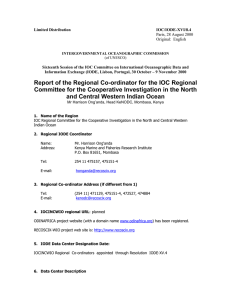Limited Distribution IOC/IODE-XVII/16 Paris, 24 February 2003
advertisement
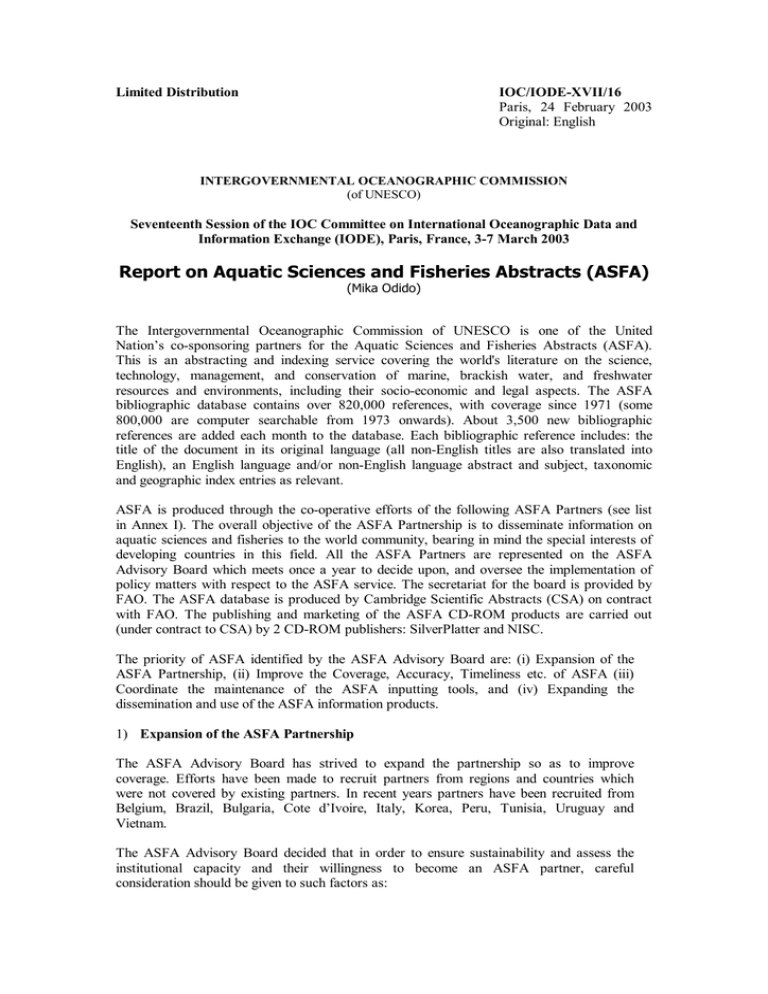
Limited Distribution IOC/IODE-XVII/16 Paris, 24 February 2003 Original: English INTERGOVERNMENTAL OCEANOGRAPHIC COMMISSION (of UNESCO) Seventeenth Session of the IOC Committee on International Oceanographic Data and Information Exchange (IODE), Paris, France, 3-7 March 2003 Report on Aquatic Sciences and Fisheries Abstracts (ASFA) (Mika Odido) The Intergovernmental Oceanographic Commission of UNESCO is one of the United Nation’s co-sponsoring partners for the Aquatic Sciences and Fisheries Abstracts (ASFA). This is an abstracting and indexing service covering the world's literature on the science, technology, management, and conservation of marine, brackish water, and freshwater resources and environments, including their socio-economic and legal aspects. The ASFA bibliographic database contains over 820,000 references, with coverage since 1971 (some 800,000 are computer searchable from 1973 onwards). About 3,500 new bibliographic references are added each month to the database. Each bibliographic reference includes: the title of the document in its original language (all non-English titles are also translated into English), an English language and/or non-English language abstract and subject, taxonomic and geographic index entries as relevant. ASFA is produced through the co-operative efforts of the following ASFA Partners (see list in Annex I). The overall objective of the ASFA Partnership is to disseminate information on aquatic sciences and fisheries to the world community, bearing in mind the special interests of developing countries in this field. All the ASFA Partners are represented on the ASFA Advisory Board which meets once a year to decide upon, and oversee the implementation of policy matters with respect to the ASFA service. The secretariat for the board is provided by FAO. The ASFA database is produced by Cambridge Scientific Abstracts (CSA) on contract with FAO. The publishing and marketing of the ASFA CD-ROM products are carried out (under contract to CSA) by 2 CD-ROM publishers: SilverPlatter and NISC. The priority of ASFA identified by the ASFA Advisory Board are: (i) Expansion of the ASFA Partnership, (ii) Improve the Coverage, Accuracy, Timeliness etc. of ASFA (iii) Coordinate the maintenance of the ASFA inputting tools, and (iv) Expanding the dissemination and use of the ASFA information products. 1) Expansion of the ASFA Partnership The ASFA Advisory Board has strived to expand the partnership so as to improve coverage. Efforts have been made to recruit partners from regions and countries which were not covered by existing partners. In recent years partners have been recruited from Belgium, Brazil, Bulgaria, Cote d’Ivoire, Italy, Korea, Peru, Tunisia, Uruguay and Vietnam. The ASFA Advisory Board decided that in order to ensure sustainability and assess the institutional capacity and their willingness to become an ASFA partner, careful consideration should be given to such factors as: IOC/IODE-XVII/16 Page 2 • Mandates and programmes of the institution (and the parent institution), e.g. the institution must have the mandate to collect, organize and provide access to aquatic sciences and/or fisheries literature; • Existing activities in ASFA related areas such as collection of literature in ASFA scope, compilation of bibliographic records and creation and maintenance of bibliographic databases; • Ability to allocate resources, including human resources, to ASFA activity; • Institutional sustainability; and, Institutional and staff commitment to ASFA. • Volume of national literature outputs in the fields of aquatic sciences and fisheries; • Contribution of aquatic sciences and fisheries to national development; • Contribution to the world fish and fishery production; • Benefit to the country by participating in ASFA; and • willingness and capacity to become an ASFA partner. The ASFA Advisory Board decided that, the following countries should be priority when identifying new partner institutions: Philippines, Thailand, Netherlands, South Africa, Israel, New Zealand, Nigeria, Egypt, Indonesia, Tanzania, Sri Lanka. 2) Improve the Coverage, Accuracy, Timeliness etc. of ASFA The ASFA database currently has close to 900,000 records, which increases at the rate of 3540,000 records a year. At this rate the ASFA database will reach the 1 million record mark somewhere in the middle of the year 2005. Monitoring List currently contains more than 3175 serial titles. In addition ASFA covers all other types of publications including books and grey literature. The ASFA Advisory board has provided support through the ASFA Trust Fund to enable the conversion of ASFA printed journals from 1971-1974 to machine readable format. These records have been added to the database. Similar support has been provided to other initiatives to improve coverage of the database such as translation of guides and reference materials to other languages, and conversion of special datasets to ASFISIS format and their inclusion in the database. CSA has imported relevant records from other databases it maintains into ASFA. Regular training in ASFA input methodology is provided to the ASFA input centres by the secretariat based at FAO in order to ensure that the quality of the database is maintained. The secretariat also provides extensive backstopping and editorial control of input prepared by newly trained partners. Several actions were recommended in order to improve timeliness (the time lag between publication date of a document and the actual appearance of its reference on the ASFA database). These include (i) partners prioritising ASFA input covering core journals first, (ii) partners sending records to CSA in small batches rather than one batch once a year, (iii) scanning abstracts rather than keying in, to save time. 3) Maintenance of the ASFA inputting tools. The web based software for ASFA data input and retrieval- www-ISIS-ASFA was launched in 2002 to replace the DOS based software ASFISIS (release-3), which has been used to prepare ASFA input in machine readable format since 1998. Training on ASFA input methodology was organised for new input centres using the www-ISIS-ASFA. A training course for new input centres. A one day familiarization was also organized for existing input centres after the ASFA Advisory Board meeting in June 2002 (Rome, Italy) to introduce the new features, and the look and feel of the software. The secretariat has compiled user friendly IOC/IODE-XVII/16 Page 3 guidelines for the installation of the new software. The software developers will maintain a Help Desk for one year in order to assist partners with problems. The three major guidelines for data input (bibliographic, abstracting and indexing) were completely revised to bring them into line with the new software. Because it is not certain how long it will take all ASFA Partners to switch over to the new input software, CSA will continue the processing of Partner's input submitted using the "old" DOS ASFISIS software. 4) Expanding the dissemination and use of the ASFA information products. The ASFA publishers (CSA), in collaboration with UN co-sponsoring partners FAO and IOC initiated a programme to provide access to ASFA to Low Income Food Deficient Countries (LIFDC) in Africa on CD-ROM, and via internet access to all LIFDCs world wide for an initial five year period (2000-2004). A total of 26 institutions in Africa received the ASFA CD-ROM. In most of the institutions, the ASFA CD-ROM has been a very popular source of information. However some of the institutions were unable to use the CDs optimally due to several reasons, including lack of PC’s with a CD drive. The ASFA Internet Database Service has also been very popular. However fewer institutions opted for this option- probably because of the limited penetration of fast reliable, economic, Internet connections in LIFDC countries. The publisher and the board has also provided significant reductions in subscriptions to developing countries, and free use of ASFA records in development of databases for non-profit usage. In an effort to further expand the usage of ASFA, the ASFA Secretariat has been trying to expand the language capability of ASFA through activities such as: i) inclusion of original language titles in bibliographic references (ii) inclusion of non-English abstracts in bibliographic references (iii) carrying-out of some ASFA training courses in languages other than English, such as Spanish, French, and Italian, (iv) carrying-out some of the correspondence with new Partners (i.e. regarding their problems in input preparation) in Spanish, French, Italian (v) translation of the extensive "Help Notes" that will accompany the new www-ISIS-ASFA software into Spanish and French; (vi) increasing the language skills of some ASFA Secretariat staff through attendance at language training courses. English remains the carrier language of ASFA as the entire ASFA system, its tools, its functioning etc. (e.g. Thesaurus, Guidelines, Meetings, correspondence, e-mails etc.) cannot, in the near future, be multi-lingual. ANNEX I: ASFA Partners United Nations Co-sponsoring ASFA Partners (FAO, IOC, UNDOALOS and UNEP, which is in the processes of renewing its sponsorship of ASFA). The 4 UN Co-sponsoring ASFA Partners, besides input preparation, also take responsibility for assisting developing countries to participate in the ASFA Partnership. International ASFA Partners ADRIAMED ICCAT (ICES, ICLARM, IUCN, PIMRIS) . The 6 International ASFA Partners contribute to ASFA by producing bibliographic references to the literature published within their geographic or subject area, including their own publications. National ASFA Partners (Argentina, Australia, Belgium, Brazil, Bulgaria, Canada, Chile, Côte d'Ivoire, Cuba, Estonia, France, Greece, Germany, India, Italy, Japan, Kenya, Korea, IOC/IODE-XVII/16 Page 4 Lithuania, Mexico, Morocco, Norway, People's Republic of China, Peru, Poland, Portugal, Russia, Spain, Sweden, Tunisia, Ukraine, United Kingdom, Uruguay, United States and Vietnam). The 35 National ASFA Partners contribute to ASFA by producing bibliographic references to the literature published within their own countries. The Publishing ASFA Partner (Cambridge Scientific Abstracts, CSA). The ASFA Partners submit their ASFA input (in computer readable format) to the Publishing ASFA Partner, Cambridge Scientific Abstracts, located in the USA (CSA, itself, also prepares a large portion of the ASFA input). CSA processes the input received from the ASFA Partners, by computer, and merges it to create a Master File (i.e. the ASFA database). From the Master File, CSA produces the ASFA information products and services, which CSA then distributes back to the ASFA Partners for use in their respective information systems. CSA also makes the ASFA products available commercially to the public. ANNEX II: ASFA Journals The ASFA Abstracts Journals continue to be published by CSA . These include: ASFA-1, Biological Sciences and Living Resources is the monthly abstracts journal covering all biological and ecological aspects of marine, brackish and freshwater environments including fisheries and living resources, aquaculture, aquatic communities, and legal and socio-economic studies related to fisheries and aquaculture ASFA-2, Ocean Technology, Policy and Non-Living Resources is the monthly abstracts journal covering physical and chemical oceanography and limnology, marine geophysics and geochemistry, marine technology, ocean policy, and non-living resources. ASFA-3, Aquatic Pollution and Environmental Quality is the bi-monthly abstracts journal covering marine and freshwater pollution and environmental quality. ASFA Aquaculture Abstracts is the bi-monthly journal covering aquaculture and it represents a spin-off product from ASFA-1. ASFA Marine Biotechnology is a quarterly journal covering marine biotechnology, and it represents a spin-off product from ASFA-1. ANNEX III: INSTITUTIONS IN AFRICA RECEIVING FREE ASFA CD THROUGH LIFDC INITIATIVE 1) Instituto Investigacao Pesqueira, Angola 2) Direction des Peches, Benin 3) Institut de l'Environment et de Recherches Agricoles, Burkina Faso 4) Départment des Eaux, Pêches et Pisciculture, Burundi 5) Bibliotecheuqe Centrale de L'Universite du Burundi, Burundi 6) Station de Recherche Halieutique et Oceanographique a Limbe, Cameroon 7) Instituto Nacional de Desenvolvimento das Pescas, Cape Verde 8) Centre Nationale de Recherche Agronomique, Station Pisciculture, Cote d'Ivoire 9) Arab Academy for Science and Technology and Maritime Transport, Egypt 10) Marine Biology and Fisheries Institute, Eritrea 11) Ministry of Fisheries, Eritrea 12) Fishery Resources Development Department, Ministry of Agriculture, Ethiopia 13) Fisheries Department, Ministry of Natural Resources, Gambia 14) Water Research Institute, Council for Scientific and Industrial Research, Ghana 15) Centre National des Sciences Halieutiques de Boussoura, Guinea 16) Department of Zoology, University of Nairobi, Kenya IOC/IODE-XVII/16 Page 5 17) Ministere de la Peche et des Ressources Halieutiques, Madagascar 18) Centre National de la Recherche en Oceanographie et Peche, Mauritania 19) Institut National de Recherche Halieutiques, Morocco 20) Nigerian Institute for Oceanography and Marine Research, Nigeria 21) Centre de Recherches Oceanographiques de Dakar-Thiaroye, Senegal 22) Direction de l'Océanographie et des Pêches Maritimes, Senegal 23) Tanzania Fisheries Research Institute, Tanzania 24) Institute of Marine Sciences, University of Dar-es-Salaam, Zanzibar, Tanzania 25) Fisheries Research Institute, Uganda 26) Lake Victoria Fisheries Research Organisation, Uganda ANNEX IV: ASFIS REFERENCE SERIES 1) ASFIS-1, Serials Monitored for the ASFIS Bibliographic Database (commonly called Monitoring List). 2) ASFIS-2, Subject Categories and Scope Descriptions 3) ASFIS-3, Guidelines for Bibliographic Description 4) ASFIS-4, Abstracting 5) ASFIS-5, Guidelines for Indexing 6) ASFIS-6, Aquatic Sciences and Fisheries Thesaurus 7) ASFIS-7, Geographic Authority List 8) ASFIS-8, Taxonomic Authority List 9) ASFIS-9, Database User Guide 10) ASFIS-10, Authority List for Corporate Names 11) ASFIS-11, Magnetic Tape Specifications and Record Format 12) ASFIS-12, Inter. Dir. of Ser. Pub. in Aquatic Sciences and Fisheries 13) ASFIS-13, ASFIS Database Indexing and User Guide (Chinese) 14) ASFIS-14, ASFISIS (Release-3 User Manual) ANNEX V: EXAMPLES OF ACTIVITIES FUNDED BY ASFA TRUST FUND • • • • • • • • • • • • • • • • • Support to implementation of www -ASFA-ISIS interface ASFA-FIGIS Interaction Correction of the ASFA Descriptors fields Support to the Development of Web based interface to ASFISIS together with GILW/AGRIS Provision of ASFA Centres in former USSR with ..translation (ASFIS-2, Subject Categories and Scope Descriptions) Conversion of ASFA 1974printed journals into machine readable format ( India -NIO) Conversion of ASFA 1973 Printed Journals into machine readable format (KenyaKMFRI) Conversion of ASFA 1972 Printed Journals into machine readable format (ChinaNMDIS) Conversion of ASFA 1971 Printed Journals into machine readable format (India- NIO) Improvement of ASFA Database by Germany (BF) Addition of 45,000 abstracts to 1975-77ASFA database (China-NMDIS with initial collaboration of Germany-BF) Formatting ASFA Thesaurus Support participation in annual ASFA Advisory Board Meetings Staff support to ASFA Secretariat Extension of ASFA Potential in Lithuania Coverage of Fishery Economics and Related Subjects in ASFA Extension of ASFA potential in Ukraine (YugNIRO) IOC/IODE-XVII/16 Page 6 • • • • • • • • • Provision of ASFA Centres in former USSR with reference material for input (translations) (YugNIRO) ASFISIS Maintenance (Dr. DeSmet) Convert 500 Records (from PIMRIS database into ASFISIS format Analysis of ASFA for Scope and Coverage with eventual recommendations for improvement Manual on ASFISIS software and Data Entry ASFA User Survey Training workshop on ASFA input methodology Review of the ASFA Partners Monitoring of Serials for ASFA (follow-up to 1994 review) Identification of ASFA information users and suppliers in China Requested Action from the Committee • • Review activities implemented by ASFA Advise on further IOC contribution to ASFA
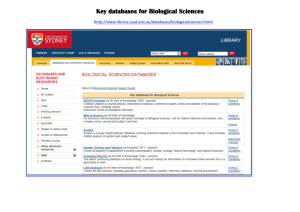
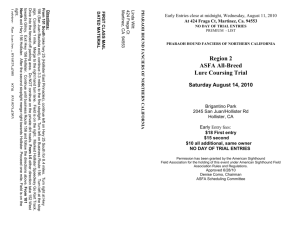
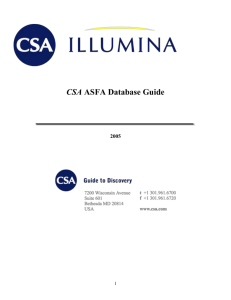
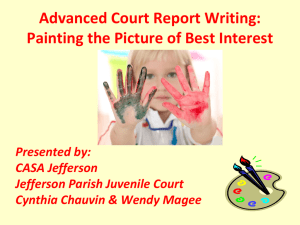
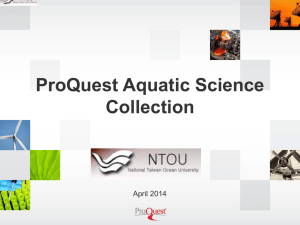
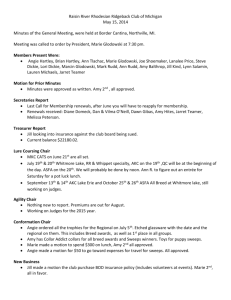
![IN SUPPORT OF [BILL/LOCAL LAW/ORDER #] TO PREVENT](http://s3.studylib.net/store/data/007674137_2-0977e9eebbd334a0536cbc5b9f940004-300x300.png)
